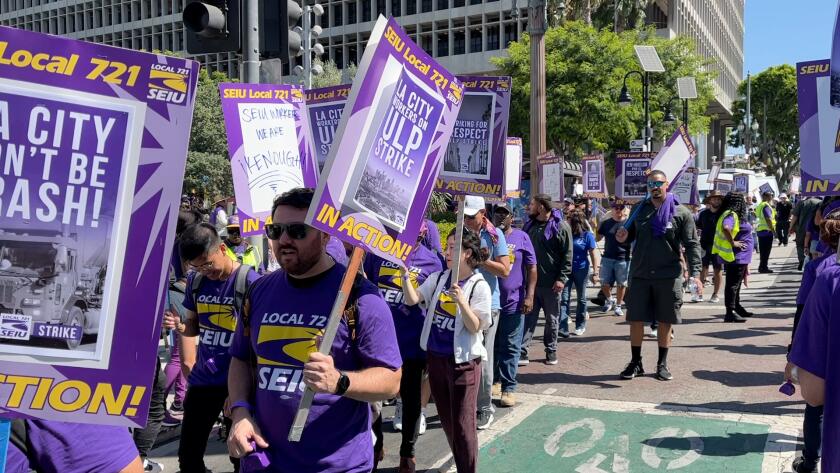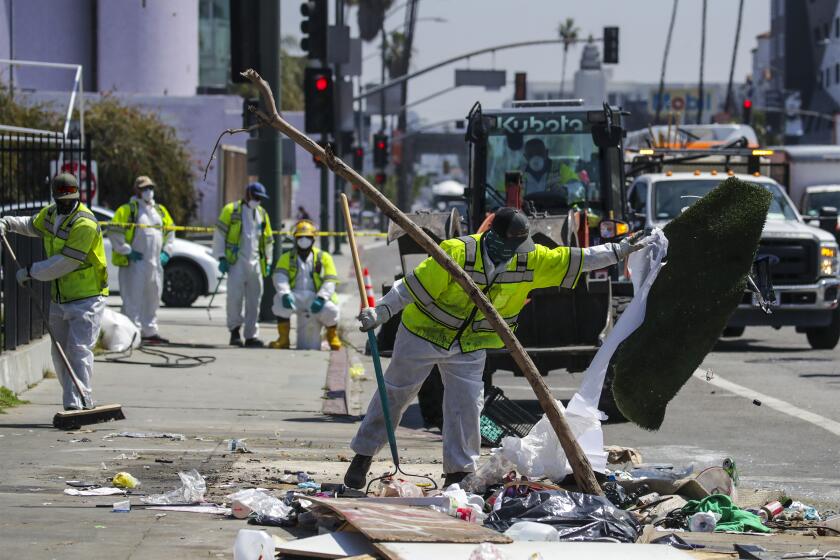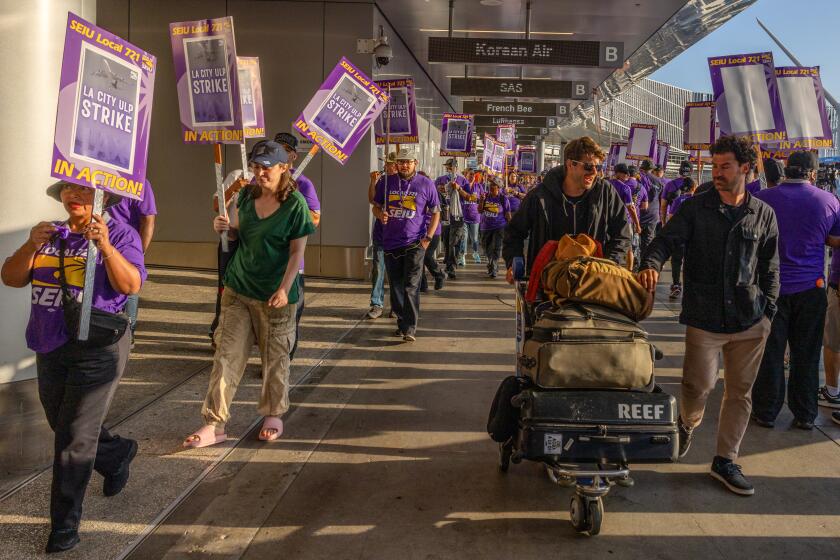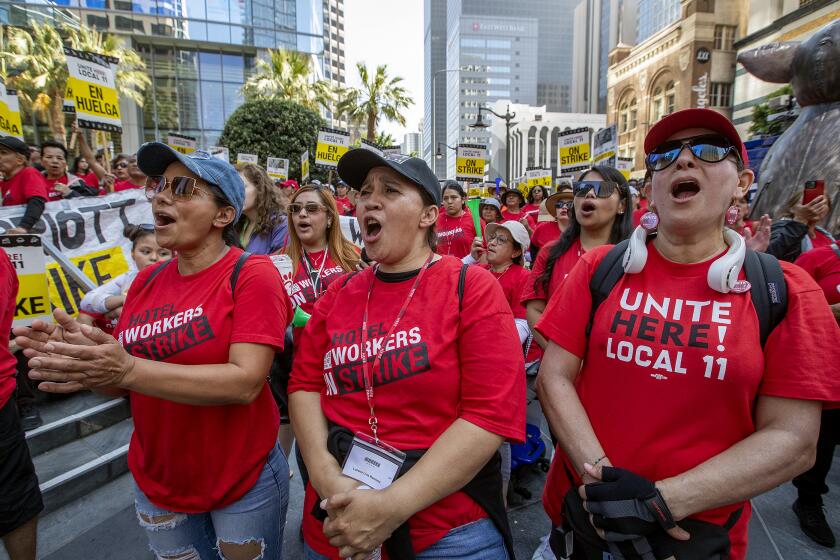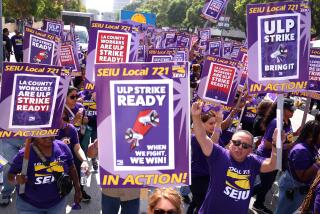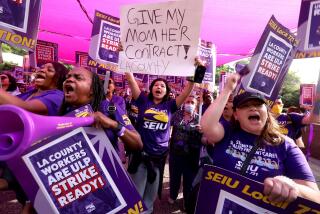Thousands of city workers have gone on strike. Bass says L.A. is ‘not going to shut down’
The one-day walkout, staged by SEIU Local 721, closed animal shelters and at least some swimming pools and delayed trash pickup until later in the week.
Workers, managers and elected officials braced for one of the biggest labor actions to hit Los Angeles city government in a generation — a one-day walkout by the union that represents traffic officers, gardeners, mechanics, custodians, lifeguards, engineers and scores of other government jobs.
Service Employees International Union Local 721, which represents more than 7,000 city workers, began its strike at 12:01 a.m. Tuesday to protest what it described as unfair labor practices by city negotiators and a failure by management to remain at the bargaining table.
David Green, the union’s president and executive director, said SEIU members have reached their limit with the number of vacant positions that plague city agencies, forcing workers to take huge amounts of overtime. Tuesday’s strike, he said, will send the message that those workers deserve respect.
“People don’t understand the hard work they do. There’s a lot of unsung heroes in the city,” Green said. “So I think it’s important that the city, that we take a day to recognize that, and let the city know ... they need to respect what we do as city employees.”
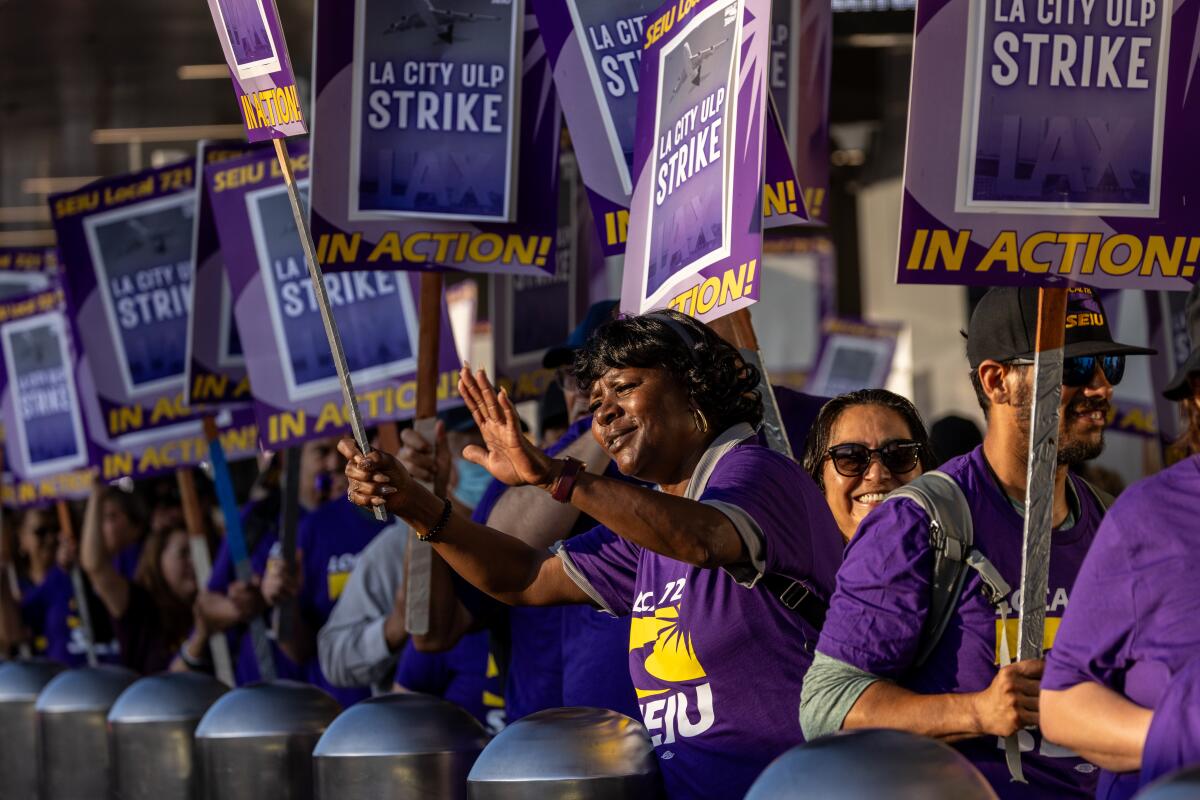
The walkout is expected to disrupt public services large and small. With SEIU representing hundreds of lifeguards, at least some public swimming pools are expected to close for the day. Trash cans won’t be emptied, delaying refuse pickup by one day for the rest of the week. Each of the city’s animal shelters will be closed. And traffic control officers may not be available for nighttime concerts at the Hollywood Bowl and at the Greek Theatre, which has a sold-out show, city officials said.
Still, Mayor Karen Bass pushed back on the notion that the city has been unwilling to bargain. In a statement, she said an array of services will continue — emergency responses from police, firefighters and paramedics; summer camps at recreation centers; city-operated preschools and day-care centers; and facilities that are housing the city’s homeless population. Libraries also will not be affected, she said.
Los Angeles city lifeguards, traffic officers, airport custodians, engineers and sanitation workers will be among those on the picket lines Tuesday.
“The City of Los Angeles is not going to shut down,” Bass said. “My office is implementing a plan ensuring no public safety or housing and homelessness emergency operations are impacted by this action. Like I said over the weekend, the city will always be available to make progress with SEIU 721 and we will continue bargaining in good faith.”
SEIU organizers plan to start the day with a 4 a.m. picket line at Los Angeles International Airport, which employs at least 1,000 of the union’s members. That event will be followed by a series of demonstrations and activities throughout the day at the airport, City Hall and dozens of other locations.
Dae Levine, acting director of communications and marketing for Los Angeles World Airports, said her agency is working to ensure that operations at LAX are “as close to normal as possible.”
“We ask our passengers to allow extra time to travel to and from the airport during the planned action,” she said.
Green, the SEIU president, said he is hopeful that thousands of additional workers with the Coalition of L.A. City Unions will decide not to cross the SEIU’s picket lines, expanding the strike’s effects. At the same time, he confirmed that the union will be issuing some “line passes” — permission to cross the picket line and go to work, largely in cases in which employees have public safety responsibilities.
In the first major walkout by Los Angeles city government workers in decades, thousands walked off the job Tuesday.
Line passes will be provided to about 200 detention officers at the Los Angeles Police Department and several hundred security workers at LAX. The union also intends to grant permission to members of the City Council to attend their regularly scheduled 10 a.m. meeting — and bring two aides with them.
Council members do not belong to SEIU Local 721, or any city union. However, given their long-standing support for organized labor, at least some probably would have stayed away without the union’s blessing.
The SEIU’s walkout is one of several labor actions to disrupt workplaces across Southern California in recent months. Workers and executives in the entertainment industry have been transfixed by the first simultaneous strike of Hollywood writers and actors since 1960. The Screen Actors Guild walked off the job last month and the writers’ strike is approaching its 100th day.
Unite Here Local 11, which represents hotel and restaurant workers, has been staging its own frequent work stoppages in L.A. and Orange counties since June 30, when contracts expired for more than 15,000 hospitality workers at some 60 properties.
Unlike the hotel union, SEIU Local 721’s contract has not run out. The union is operating under a one-year salary agreement that ends in December, which has provided members a 3% pay increase and a one-time bonus equal to 5% of a worker’s annual salary.
Hotel strikers have endured violent incidents involving security personnel at three hotels in L.A. and Orange counties, the union said in a complaint.
The 3% raise is considered “pensionable,” which means that it will expand the base used to calculate a worker’s pension once they retire. The 5% bonus, delivered to workers last month in the form of a one-time payment, will not apply to future retirement pay.
When the two sides reached that deal last year, they agreed to spend the subsequent months working through more than 400 additional proposals that had been submitted by the union but were unresolved. For example, the union was negotiating issues around bilingual pay and a request for a city “boot allowance” for sanitation workers, Green said.
After roughly four months of bargaining, city negotiators told the union they planned to combine those talks with the negotiations for the union’s next contract, which would go into effect in January. SEIU Local 721 objected, filing a complaint alleging unfair labor practices with the city’s Employee Relations Board, which reviews and issues rulings on such claims.
Green said his union did not want to negotiate its next contract while simultaneously sorting through the more than 400 side proposals left over from the prior year.
“We wanted them to be separated. [City negotiators] agreed to that, and then they changed their mind, which is unacceptable for us,” he said.
In another unfair labor practices complaint, SEIU Local 721 alleged that a union representative was denied the ability to visit a Department of Transportation work site. In yet another, the union said an SEIU representative was improperly barred from visiting an LAPD property warehouse to give a bargaining update to the union’s members. “Out of touch administrators have slammed the door in our face,” Green said.
City Councilmember Tim McOsker, who heads the council’s personnel committee, declined to weigh in on whether the SEIU’s complaints have merit, saying the Employee Relations Board needs to conduct its own assessment. McOsker, who ran last year as a strong ally of organized labor, said he wants to ensure the one-day strike won’t deter the two sides from making progress in reaching an agreement.
“I do have assurances from city management that we’ve been at the table with a sincere and good faith effort to bargain,” he said. “But I will let the determination of the [Employee Relations Board] play out, and I will not allow it to affect our ability to continue to negotiate and reach a resolution on the contract.”
City Administrative Officer Matt Szabo, who serves as the city’s chief negotiator, disagreed with the union’s claims, saying his team has “consistently bargained in good faith.” SEIU and city management have already reached agreement on “dozens of proposals” since April, he said.
“We will remain at the table and continue to work toward a fair and sustainable contract for city workers,” he said.
The SEIU’s current contract includes language barring it from going on strike or “other concerted action resulting in the withholding of service.” However, state labor law allows SEIU to go on strike to protest unfair labor practices, according to the union.
Tuesday’s 24-hour walkout is shaping up to be one of the city’s largest labor actions in decades. In 1993, Department of Water and Power workers staged a nine-day walkout, forcing hundreds of supervisors to step in to keep the lights on and the water running.
In 2006, members of the Engineers and Architects Assn. also engaged in a series of walkouts, but on a much smaller scale than the one that took place at the DWP.
SEIU has not yet submitted any salary proposals for its next contract. The city’s Executive Employee Relations Committee, which gives bargaining instructions to city negotiators, is expected to meet Wednesday to discuss the status of negotiations with SEIU and other civilian employee unions.
That committee is made up of Bass and four council members, including McOsker.
